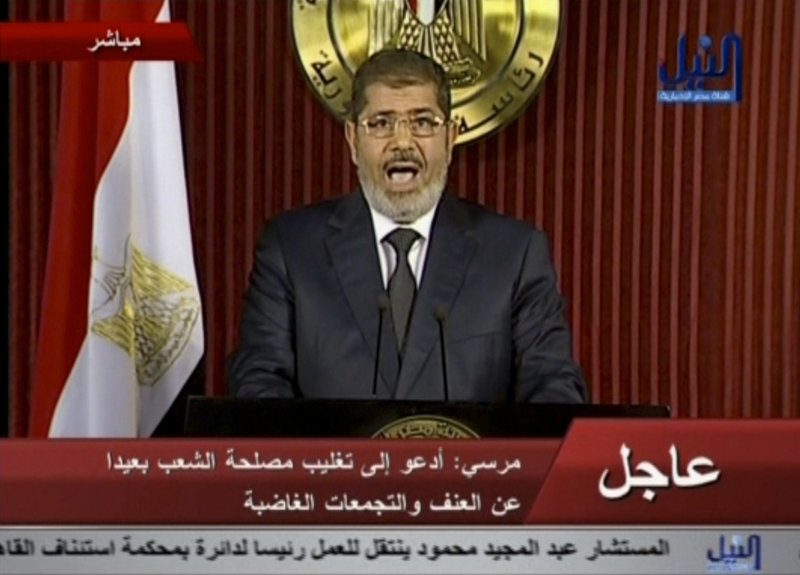CAIRO – Egyptian President Mohammed Morsi on Thursday blamed two weeks of political turmoil that have engulfed his nation on “paid elements” and refused to make any concessions to his opponents in a late-night televised speech.
Rather than mollify his opponents, the speech agitated them and sparked scenes that were eerily similar to events in the days leading to toppled leader Hosni Mubarak’s fall.
As Morsi spoke, protesters who were gathered outside the presidential palace became increasingly angry, their chants of “Leave! Leave! Leave! Leave!” growing louder, much as happened when Mubarak first addressed the nation on Feb. 1, 2011, after a week of protests. In that speech, Mubarak said that hired “political forces” were inciting the crowds.
After Morsi spoke, protesters set several Muslim Brotherhood headquarters on fire, including the one in Cairo. Two years earlier, protesters set Mubarak’s party headquarters ablaze; the charred building still stands unrepaired.
For Morsi opponents, the speech was a sign that Morsi was unwilling to entertain their complaints that he had become a dictator just five months after the nation’s first democratic election had elevated him to the presidency. They vowed to continue their protests.
“This was the speech of a dictator,” said Mohamed Radwan, 33, an engineer who was among those protesting outside the palace. “He only spoke to his” supporters.
Opposition leader Mohamed ElBaradei, responding to the speech, said Morsi’s government had lost its legitimacy after violence Wednesday outside the presidential palace left six people dead and hundreds injured. “It is now difficult to negotiate after innocent blood was shed,” ElBaradei said in a statement released to a private television station.
Within the government, resignations continued coming. A Christian adviser and the director of state broadcasting stepped down in opposition, joining three Morsi advisers who resigned Wednesday.
Morsi’s speech was a skein of seeming contradictions. He appeared to reach out to opponents, inviting them to meet with him Saturday.
But at the same time he promised no compromise. “I cannot compromise because my enemies have not yet been vanquished,” he said.
At another point, he made it clear that he believed his legitimacy flowed from his election to the presidency and that those whose candidates lost should let him govern. “I won’t tolerate anyone working to overthrow a legitimate government,” he said.
Still, he urged opponents to talk and said that everyone is free to vote against the proposed constitution in the referendum he’s set for Dec. 15. If the constitution is defeated, Morsi would then appoint a new constitutional assembly to draft another document.
“I will meet with legal experts and opposition figures on Saturday at 12:30 p.m. at the presidential headquarters to come up with a solution to save the nation,” he said.
But who was invited and what could come of such talks was not clear. ElBaradei, the former head of the International Atomic Energy Agency and Nobel Peace Prize winner who Wednesday was named the leader of the opposition, said he would not attend.
The crisis began Nov. 22, when Morsi declared that his decisions could not be reviewed by the country’s judges. It continued when the constitutional assembly, which is dominated by the Muslim Brotherhood, hastily completed a draft document before a court ruling could have dissolved the assembly. Morsi quickly approved the document and set Dec. 15 for the country to vote on it.
Since then, the opposition has called for Morsi to delay the referendum until a more representative body can craft a new version. Liberals, secularists and Christians had withdrawn from the assembly.
Send questions/comments to the editors.



Success. Please wait for the page to reload. If the page does not reload within 5 seconds, please refresh the page.
Enter your email and password to access comments.
Hi, to comment on stories you must . This profile is in addition to your subscription and website login.
Already have a commenting profile? .
Invalid username/password.
Please check your email to confirm and complete your registration.
Only subscribers are eligible to post comments. Please subscribe or login first for digital access. Here’s why.
Use the form below to reset your password. When you've submitted your account email, we will send an email with a reset code.